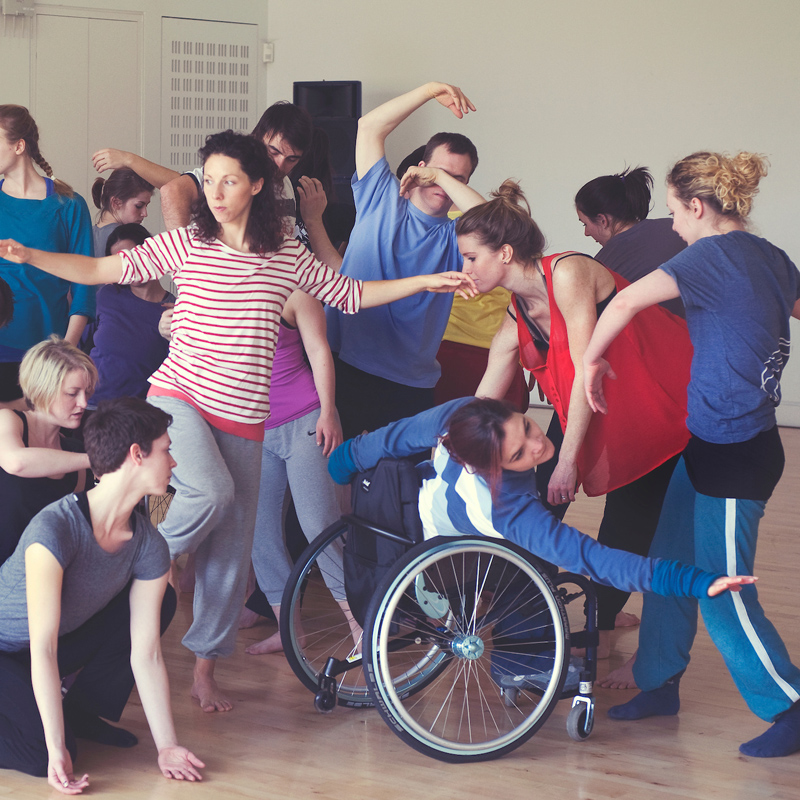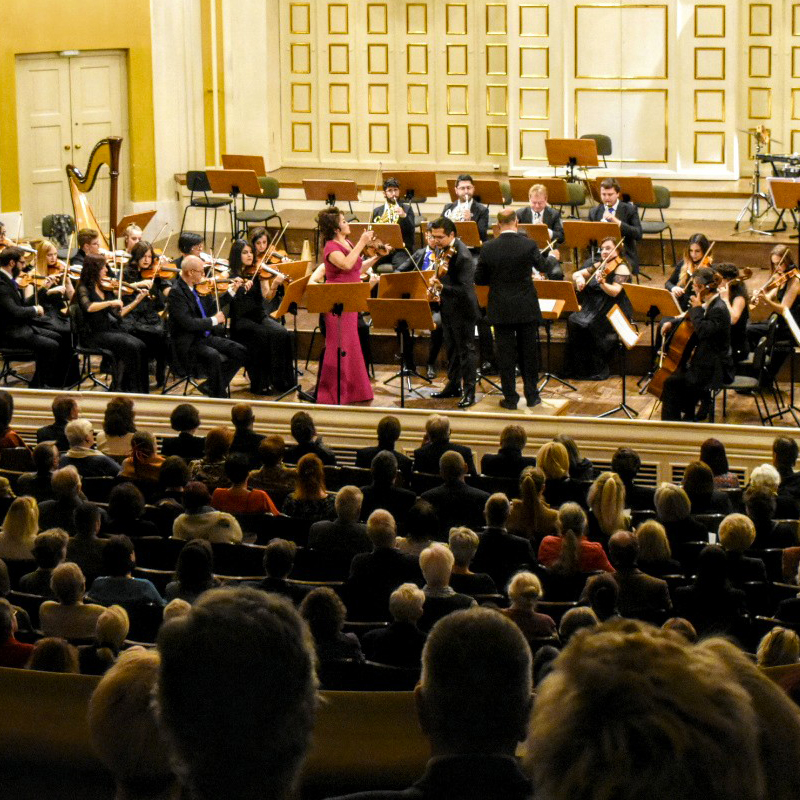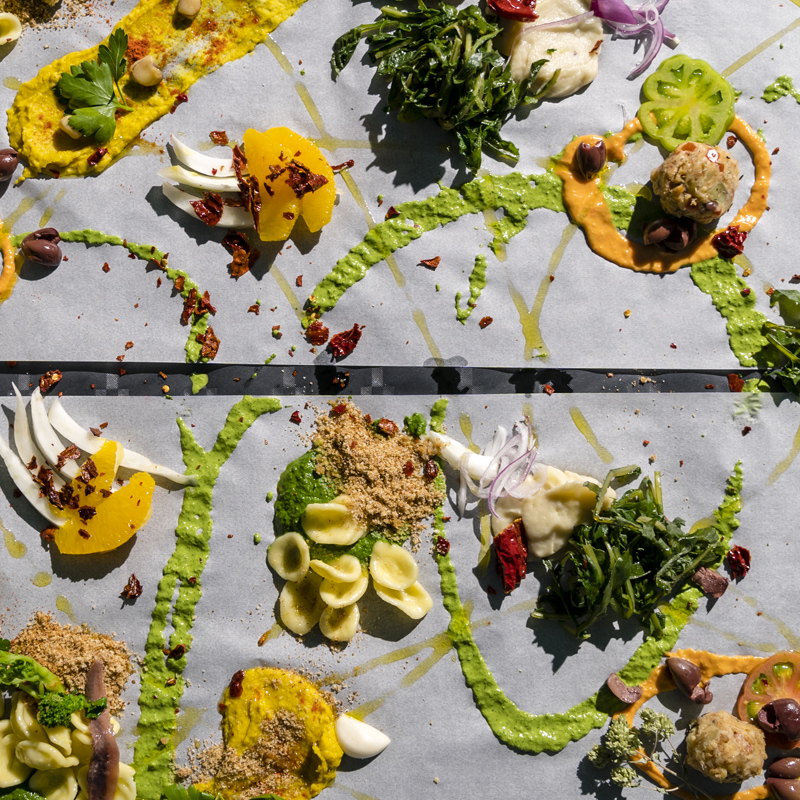Home
Public Call - Inclusive Dance Workshop for the project Movimento Libero

Update 4 July 2019
Selection of participants for the Inclusive Dance Workshop for the project Movimento Libero is now closed. Below is a list of the admitted candidates.
Update 20 June 2019
The deadline for the call has been extended. Applications can be sent up to and including June 27th. Consequently, the outcome of the selection is also postponed to the 4th July.
This inclusive dance workshop is the second phase of the project MOVIMENTO LIBERO that explores the relationship between art and disability. This ‘Dance Workshop’ is a chance for disabled and non-disabled participants to explore the exciting contribution to dance made by disabled dancers.
Stopgap - Community Dance:
The workshop will be led by the world-renowned Stopgap Dance Company (U.K) who create contemporary dance productions with a cast of disabled and non-disabled dancers. It values a pioneering spirit and is committed to making discoveries about integrating disabled and non-disabled people through dance.
Stopgap conducts creative learning projects and workshops for schools and local communities, to demonstrate how dance is accessible to all and to observe how integrating disabled and non-disabled people through such projects promotes active citizenship and social cohesion.
By filling in this form, you can apply for the Public Call to participate in the MOVIMENTO LIBERO inclusive dance workshop, led by Nadenh Poan and Siobhan Hayes, members of StopGap Dance Company, within the framework of Nessuno Resti Fuori - a theatrical, city and citizens festival. The Workshop is scheduled from 23 to 27 July 2019, it will be a 5-day course animated by English artists and open to disabled and non -disabled people: it will represent a new vision of performative art, enhancing skills through artistic expression . The workshop concludes with a performative outcome, seen as a restitution to the community, scheduled for 27 July and which will be repeated on 19 October at the opening of Stopgap’s ‘Artificial Things’ dance production.
This public call is launched by the Matera-Basilicata 2019 Foundation, the project MOVIMENTO LIBERO is a co-production with the British Council and in collaboration with IAC - Centro Arti Integrate and Oriente Occidente Dance Festival.
Registration deadlines and conditions:
Registration will end on June 20, 2019. The outcome of the selection of participants will be published on www.matera-basilicata2019.it within 10 days from the end of the registration.
In a journey that leads citizens, both temporary and permanent, to become not only spectators but also active cultural builders, the selected candidates must be in possession of the Matera 2019 Passport in order to participate in the workshop. Concessions are available for disabled people.
Any travel, board and lodging expenses are at the expense of the participants.
Registration includes a commitment to participate in all the sessions of the workshop, the performance outcome of 27 July and the rehearsals and replication on 18 and 19 October.
Who is the workshop for and what is the selection criteria?
The laboratory is open to everyone, disabled and non-disabled people who are interested in exploring new forms of movement and relationship with their own body and with others.
Minimum age: 18 years
Maximum number: 20 people
Disability must not be an obstacle to participation, we guarantee full accessibility of the location in which the laboratory will take place. The workshop will be conducted in English with Italian translation. If necessary, additional communication assistance will be made available including Italian sign language.
The selection process will be carried out by the project partners and the laboratory conductors. We will use the registration form to evaluate:
- Your experience in the dance world: as a professional dancer, dance student, amateur dancer, spectator; (We know that disabled dancers have fewer opportunities, so we will consider "experience" in a very broad sense of the term)
- Your motivation to take part in this workshop;
- Your opportunities to apply the knowledge acquired in the laboratory in Basilicata and to share it within the local artistic sector and Italy;
- The general artistic context of the laboratory and public performance.
Laboratory
23 July - 27 July 2019 - from 9:30 to 13:00
Gym of the Istituto Comprensivo Pascoli - Primary School, via Lazazzera, Matera
Performative outcome July
27 July - afternoon/evening
Piazza Giovanni XXIII (in front of the church of San Pio X)
Performative outcome July
18 October - general rehearsals, time to be defined
19 October - show, time to be defined
Sala Pasolini, il Circo, Matera
Fill in this form to participate!
Matera 2019 and Doppiozero: five e-book articles on science and the arts

Science and the arts seen as products of biological and cultural evolution: a reciprocal source of inspiration and an important channel of communication. These are ideas that the Matera2019 programme explores with a view to defining the relationship between humanist culture and scientific culture, in particular through one of the themes of the European Capital of Culture application dossier’s cultural agenda: Distant Future. This theme focuses on the age-old relationship with space and the stars – a relationship that follows in the steps of Pythagoras, one of the most illustrious residents of Basilicata – and explores the ancient universal splendour of science.
This was the starting point for Schisi, a series of five e-books created with Doppiozero, in an online cultural magazine edited by Marco Belpoliti. The five e-book articles on science and the arts are curated by Agostino Riitano – a project manager supervisor for Matera2019 – and focus on five authors who investigate interdisciplinary aspects, combining the rigour of their research with particular attention to the accessibility of the texts. The first volume is by Mario Porro with the title 'Margins of Science'. You can download the book for free here.
Collaboration with Doppiozero will generate one issue per month up until September, when two projects from the cultural programme will be presented to the public, blending science and the arts together emblematically: Wave and Quantum Dance. This Matera2019 event benefits from collaboration with major Italian and European scientific institutions, including the ASI/Space Geodesy Center in Matera, Trieste 2020 European City of Science and CNR.
The series has one objective in particular, which is to chart a course between the humanities and the pure sciences.
Classical Music from Matera to Europe

One of the leading lights of the Lucanian revival – the Egidio Romualdo Duni Conservatoire in Matera – has performed in some of the most prestigious concert halls in Europe, even in Salzburg, Mozart’s home city!
For the Duni Europe project, produced with the Italian Chamber Music Society over four venues, Duni musicians took up the challenge of making chamber music accessible to everyone through a series of new international concerts. Following the great success of the performances held on 30 April at the Conservatoire’s Auditorium in Matera, on 1 May in the town of Ariano Irpino and on 3 May at Casale Monferrato in its magnificent Municipal Theatre, the orchestra performed in one of the most famous concert venues: the Mozarteum in Salzburg. The Symphony Orchestra of the Egidio Romualdo Duni Conservatoire of Matera, conducted by Francesco Di Mauro, was the highlight of a concert which opened and closed with two works by contemporary composers from Lucania: Antonello Tosto and Damiano D’Ambrosio.
The concert featured the soloists Aiman Mussakhajayeva (violin), Adolfo Alejo (viola), Chungwha Lim (soprano) and the piano duo Sergio Marchegiani and Marco Schiavo. The programme also included the following works by Mozart: Piano Concerto No. 10 for Two Pianos and Orchestra in E-Flat Major (KV 365), an aria from Don Giovanni (‘Mi tradì quell’alma ingrata’), the Sinfonia Concertante for Violin and Viola in E-Flat Major (KV 364) and two traditional Korean pieces, Dumulmori Arirang (Arirang of Love) by Geung-Soo Yim, and Mukungwha Arirang by Deok-Ki Chung. The versatile musician Antonello Tosto – who has composed music for various ensembles, including bands – dedicated his work to Matera, the city where he has studied and taught. In the Canto dei Sassi, Damiano D’Ambrosio – a composer from Lucania and tutor at several conservatoires – is inspired by his homeland, through music. The sub-title, Symphonic Postcards from Matera, is a suite for orchestra and reciting voice, which combines research and local tradition.
The ethnographical research, which brings people together through music, includes the two traditional Korean pieces. An Arirang is a Korean folksong, which has also listed by UNESCO.
Duni Europa combines musical traditions and cultures, which are expressed in the heart of the city that symbolises western music.
The sounds, colours and scents of the Edible Orchestra: bearers of a profound message

A series of concerts, live performances and book presentations dedicated to food and its role not only as food but as a tool for socialising and creativity and an essential commodity for the well-being and economy of a community that can influence environmental equilibrium and stimulate social responsibility. Edible Orchestra offered a programme of innovative activities aimed at spreading these principles which, with the involvement of Italian and European artists, has seen the active participation of citizens.
The initial choice of venue for these events was the fruit and vegetable market, a meeting place and symbol of spontaneous gathering where it is possible to choose and express stances and which lent itself well to the message to be disseminated. The not too favourable climate did not stop the activities but unfortunately meant that they were transferred between the nearby Community Centre of Matera 2019 and the Gervasio auditorium.
On 9 and 10 April, the food designer Nick Difino led dozens of cultural inhabitants and temporary citizens in the preparatory workshops for the performance on Thursday of Les Tableaux Mangeants, an installation consisting of edible elements where food transcends the plate and becomes a palette of colours with which to experiment and seduce. Three days in which we went from talking about foods from memory and tradition to a shared selection of dishes to be cooked, from a lesson in the history of art to sharing the essential notions behind the choice of dishes that responded at the same time to both sentiment and the aesthetics of the work.
Before the artist's performance, there was a presentation of the book by Federico Valicenti Dalla tavola lucana al paradiso, a reading to be decanted like a fine wine. The Basilicata-born chef spoke to us about food as a metaphor for life and sharing because at the table you must be in good company to truly understand the essence of the dishes.
On 12 April the presentation/performance format was repeated with the journalist Stefano Liberti who in the afternoon transported us to the world of large-scale distribution with the book written together with his colleague Fabio Ciconte 'Il grande carrello. Chi decide cosa mangiamo'. At 20.00, Daniele De Michele as his alter-ego Don Pasta presented UNITED FOOD OF MATERA, an original multimedia performance based on the testimonies of eight citizens of Matera and their authentic relationship with food and cooking followed by a 'Cooking DJ Set': vinyl and pots, mixers and blender for a spicy DJ set of sounds from the whole world, including funk, reggae, South American and Mestizo London. A performance where you give yourself over to the excitement of food, its aromas, colours and forms.
On the final evening of Saturday 13 April, the headline event, a concert from the Vegetable Orchestra, was the first of its kind in the world. The distinctive feature of the Viennese ensemble is to perform only with musical instruments made from fresh fruit and vegetables, which for Matera 2019 were created together with temporary citizens.
Aided by drills, knives and screwdrivers, musicians and citizens have turned carrots into flutes or xylophones, leeks into violins and radishes into saxophones. For the concert in Matera an exceptional vegetable, the Crusco pepper, was used to introduce an original version of Stravinsky’s 'Le sacre du printemps', renamed by the orchestra as 'Le Massacre du printemps'.
The mix of sounds produced by vegetable instruments create an unusual and extremely rich universe of acoustics (not to mention the aromas that flood the environment) that could not be achieved with traditional instruments. And the effect is surprising from the very first notes.
Here are a few figures on the vegetables used: 30 aubergines, 5 cucumbers, 3 kg of dried beans, 170 carrots of different sizes, 2 cabbages, 10 Savoy cabbages, 3 large pumpkins, 20 leeks, 5 bunches of parsley, 5 bunches of spring onions, 25 white radishes, 3 bunches of salad greens, 8 celeriac, not to mention a number of large red, yellow and green peppers, onions, potatoes and courgettes.
At the end of the concert, which lasted about an hour, the audience gave a standing ovation not only for the Vegetable Orchestra that has been performing all over the world for 20 years, but also, and above all, for their message: the products of nature are indispensable for the community and must be defended at all costs.
The vegetables were provided for this occasion by Coldiretti Basilicata and, after the performance, they were donated to Don Angelo, pastor of the Church of San Rocco, to make a large soup to feed the poorest members of the parish.






 The outcome of the selection 'Public Call - Inclusive Dance Workshop for the project Movimento Libero'.
The outcome of the selection 'Public Call - Inclusive Dance Workshop for the project Movimento Libero'.